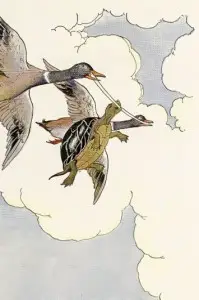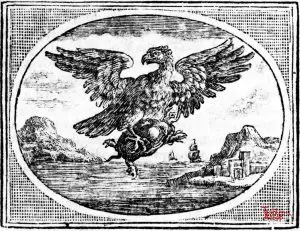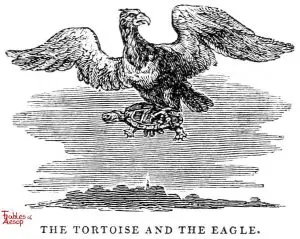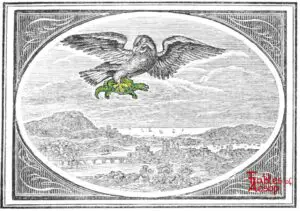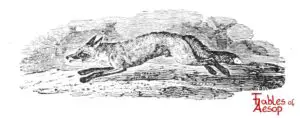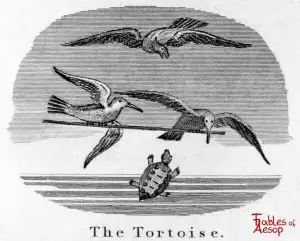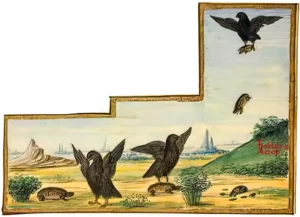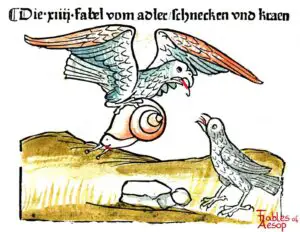A Tortoise wanted to fly and promised riches. An Eagle heard and took the Tortoise for a ride. No reward though so a second ride and sudden drop followed.
Never put yourself in your enemy’s clutches.

Eliot/Jacobs Version
A Tortoise, basking in the sun, wondered aloud what it would be like to fly. An Eagle, overhearing her, offered to take her aloft. The Tortoise agreed and the Eagle carried her almost to the clouds, but suddenly let her go. She fell to the ground, dashing her shell to pieces. The Eagle then landed and made a meal of the poor Tortoise.

Aesop For Children (The Tortoise and The Ducks)
The Tortoise, you know, carries his house on his back. No matter how hard he tries, he cannot leave home. They say that Jupiter punished him so, because he was such a lazy stay-at-home that he would not go to Jupiter’s wedding, even when especially invited.
After many years, Tortoise began to wish he had gone to that wedding. When he saw how gaily the birds flew about and how the Hare and the Chipmunk and all the other animals ran nimbly by, always eager to see everything there was to be seen, the Tortoise felt very sad and discontented. He wanted to see the world too, and there he was with a house on his back and little short legs that could hardly drag him along.
One day he met a pair of Ducks and told them all his trouble.
“We can help you to see the world,” said the Ducks. “Take hold of this stick with your teeth and we will carry you far up in the air where you can see the whole countryside. But keep quiet or you will be sorry.”
The Tortoise was very glad indeed. He seized the stick firmly with his teeth, the two Ducks took hold of it one at each end, and away they sailed up toward the clouds.
Just then a Crow flew by. He was very much astonished at the strange sight and cried:
“This must surely be the King of Tortoises!”
“Why certainly——” began the Tortoise.
But as he opened his mouth to say these foolish words he lost his hold on the stick, and down he fell to the ground, where he was dashed to pieces on a rock.
Moral
Foolish curiosity and vanity often lead to misfortune.

Townsend version
A Tortoise, lazily basking in the sun, complained to the sea-birds of her hard fate, that no one would teach her to fly. An Eagle, hovering near, heard her lamentation and demanded what reward she would give him if he would take her aloft and float her in the air. “I will give you,” she said, “all the riches of the Red Sea.” “I will teach you to fly then,” said the Eagle; and taking her up in his talons he carried her almost to the clouds suddenly he let her go, and she fell on a lofty mountain, dashing her shell to pieces. The Tortoise exclaimed in the moment of death: “I have deserved my present fate; for what had I to do with wings and clouds, who can with difficulty move about on the earth?”
Moral
If men had all they wished, they would be often ruined.

Samuel Croxall
THE Tortoise, weary of his condition, by which he was confined to creep upon the ground, and being ambitious to have a prospect, and look about him, gave out, that if any Bird would take him up into the air, and show him the world, he would reward him with a discovery of many precious stones, which he knew were hidden in a certain place of the earth: the Eagle undertook to do as he desired; and when he had performed his commission, demanded the reward. But finding the Tortoise could not make good his words, he stuck his talons into the softer parts of his body, and made him a sacrifice to his revenge.
THE APPLICATION
As men of honour ought to consider calmly how far the things which they promise may be in their power, before they venture to make promises upon this account, because the non-performance of them will be apt to excite an uneasiness within themselves, and tarnish their reputation in the eyes of other people; so fools and cowards should be as little rash in this respect as possible, lest their impudent forgeries draw upon them the resentment of those whom they disappoint, and that resentment makes them undergo smart, but deserved chastisement. The man who is so stupid a knave as to make a lying promise where he is sure to be detected, receives the punishment of his folly unpitied by all that know him.

Thomas Bewick (The Tortoise and The Eagle)
A Tortoise, weary of his condition, by which he was confined to creep upon the ground, and ambitious to look about him with a larger prospect, proclaimed that if any bird would take him up into the air, and shew him the world, he would reward him with the discovery of an invaluable treasure, which he knew was hidden in a certain place of the earth. The Eagle accepted the offer, and having performed his undertaking, gentlv set the Tortoise again on the ground, and demanded the reward. The Tortoise was obliged to confess that he could not fulfil his promise, which he had made only with the view of having his fancy gratified. The Eagle, stung with resentment at being thus duped, grasped him again in his talons, and then soaring to a great height, let him fall, by which he was dashed to pieces.
APPLICATION.
Men of honour arc careful not to tarnish their reputations by falsifying their word, and always consider well how far it may be in their power to fulfil their promises before they make them. They always strive to walk on the straight line of rectitude; and should they, in an unguarded moment, happen to stagger from it, they instantly retrace their steps, and feel unhappy until they have regained their station. There is a simplicity in truth and virtue, which requires no artifices, and never leads us into difficulties, but points out the plain and safe way. Deceit and cunning, on the contrary, involve those who practise them in a maze, and they are bewildered in their own falsehoods, from which no dexterity can extricate them. The brain-racking schemes which villains practise to delude others, are commonly detected, and end in the unpitied punishment of themselves; for they seldom discover the folly of being wicked, until it has betrayed them into their ruin. But such persons would do well to refresh their memories with the old adage which says, that “all knaves are fools, but all fools are not knaves.”

Jefferys Taylor
ONCE a tortoise complain’d (though ’twas not of much use),
That he scarce could see over the back of a goose;
That his legs were so short, and his pace was so slow,
Of the world and its wonders he nothing could know.
So at last he determined to alter his lot,
Or at least for a season to rise from that spot;
So he mention’d his thoughts to a bird that he knew,
Who agreed to oblige him and give him a view.
So this bird, and another, supported a stick,
Which was not very heavy, or clumsy, or thick;
This the tortoise enclosed in his mouth very tight,
While the birds soon ascended a wonderful height.
But an eagle who chanced the strange creature to see,
Exclaim’d with amazement, “Pray who can that be?”
“O, the king of the tortoises! do not you know him?”
Said they; “’tis our honour his kingdom to show him.”
Said the bird, “Ere I take that as true, I must pause;”
The tortoise impatient, then open’d his jaws
To confirm his new title, when straight he descended!
So his journey, and reign, and existence were ended!
So far had the tortoise to fall, they relate,
That he’d time while descending to muse on his fate,
“Ah!”thought he, “thus I pay for my foolish ambition,
Which would not be content with a humble condition;
Yet I might have hung safely, I cannot deny,
Had my mouth not been open’d to utter a lie.”

JBR Collection
A Tortoise, weary of crawling about on the ground at a snail ‘s pace, desired to fly in the air like the birds, and gave out that if any bird would take him up in the clouds and show him the world, he would tell him in return where to find treasures hid in the earth. The Eagle thereupon did as he wished, but finding that the Tortoise could not keep his word, carried him up once more, and let him fall on a hard rock, where he was dashed to pieces.

Gherardo Image from 1480

Heinrich Steinhöwel (Of the Lark, the Snail, and the Crow)

Aquila et Testudo
Testudo aquilam magnopere orabat, ut volare sese doceret. “Rem petis,” inquit aquila, “naturae tuae contrariam, nam quomodo poteris volare, cum alas non habeas?” Testudo autem nihilominus aquilam obsecrabat ut se volucrem facere vellet. Itaque eam ungulis arreptam aquila sustulit in sublime ibique demisit, ut per aera ferretur sed, cum in rupes decidisset, comminuta interiit.
Perry #230
